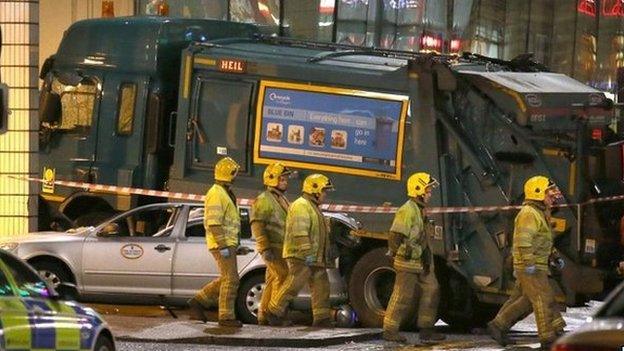Glasgow bin lorry crash driver 'lied' over blackout
- Published
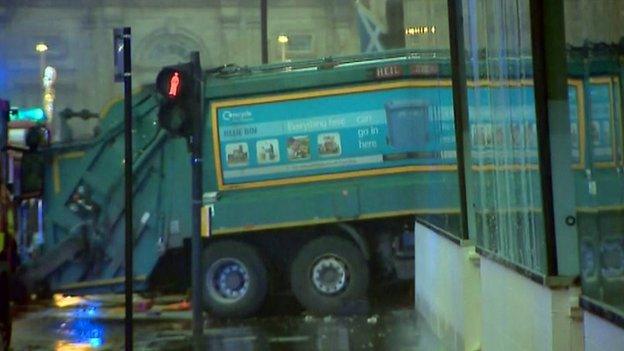
The bin lorry crashed into the Millennium Hotel after careering through the city centre
The inquiry into the Glasgow bin lorry crash which killed six people has heard the driver "lied" on a DVLA form over a previous blackout.
Glasgow Sheriff Court was told that 58-year-old Harry Clarke passed out at the wheel of a bus on 7 April 2010.
It has now heard a DVLA assessment form from 2011 noted he had no history of blackouts within the past five years.
One of Mr Clarke's managers agreed that if he did pass out in 2010 then the DVLA statement was a lie.
The court previously heard that Mr Clarke was unconscious at the wheel as the Glasgow City Council bin lorry went out of control on Queen Street on 22 December 2014, killing six pedestrians and injuring 15 others.
Medical assessment
The fatal accident inquiry (FAI) has also heard from First Bus inspector John Stewart who told the court that Mr Clarke, in his previous employment as a bus driver, had blacked out while unwell at a bus stop in 2010.
On Wednesday, the sixth day of the FAI, which is being overseen by Sheriff John Beckett QC, the court heard evidence from Douglas Gellan, an area manager with Glasgow City Council's land and environmental services department.
He was questioned by Dorothy Bain QC, who is acting for the bereaved Morton family.
Mr Gellan agreed that a medical assessment was important in the recruitment of a bin lorry driver as anyone unfit would be a risk to the public.
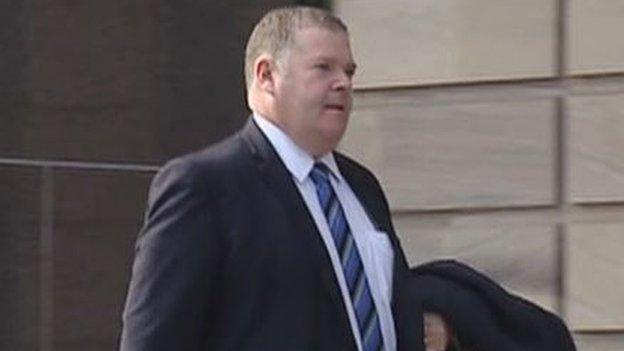
Douglas Gellan agreed that Mr Clarke may have lied on a DVLA assessment
The witness confirmed that medical assessment was outsourced to private firms and he agreed with Ms Bain that an employee found to have lied in medical questionnaires would face "serious disciplinary consequences".
The inquiry was shown a Bupa medical questionnaire filled in by Mr Clarke in December 2010, in which he claimed to have been off work for seven days of sickness in the previous two years.
The hearing was then shown an attendance record from his employment with First Bus when he was a driver in 2010, that detailed a three-and-a-half week period of sickness in April that year. It also showed a one-week period of sickness in March of the same year.
During the inquiry it was heard that before working as a bin lorry driver with Glasgow City Council, Mr Clarke was taken on as a driver taking special needs children to school and then a gritter.
Sickness declaration
The inquiry was also shown a HM Revenue and Customs (HMRC) sick pay declaration from Mr Clarke where it says he had last worked on 7 April 2010 and the reason for his sickness was "Vasovagal", which Ms Bain explained meant "faint".
Mr Gellan said he would have wanted to know about this.
He also said that if forms had been misleadingly filled in, the council would investigate but it would rely on individuals to tell the truth in the first place.
The inquiry heard that Mr Clarke had to renew his HGV licence every five years after turning 45.
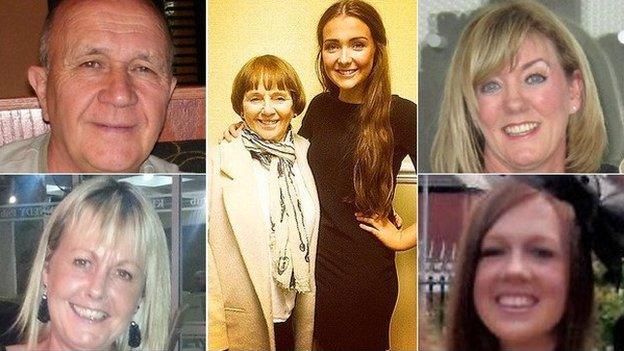
(Clockwise from top left) Jack Sweeney, Lorraine Sweeney, Erin McQuade, Jacqueline Morton, Stephenie Tait and Gillian Ewing were killed in the crash
He had a DVLA (the government's Driver & Vehicle Licensing Agency) assessment with a Doctor Willox on 6 December 2011.
Ms Bain produced the assessment form from that day which claimed Mr Clarke had no history of blackouts within the past five years.
The QC noted that as it stands, it is a "hypothetical assertion" that Mr Clarke had in fact "blacked out" in 2010. This was based on the report of bus inspector Mr Stewart.
Ms Bain asked Mr Gellan that if we accepted that Mr Clarke had blacked out in 2010, was his statement on the DVLA form a lie?
Mr Gellan agreed that it was a lie.
'Unfit for duty'
Ms Bain said police had later asked Dr Willox what she would have said if she had been told about the alleged 2010 blackout.
The QC said Dr Willox told police she would have disclosed the alleged 2010 incident to the DVLA and the council, asked for Mr Clarke's medical records and declared him "temporarily unfit for duty".
Ms Bain then asked Mr Gellan if he knew if Mr Clarke had been investigated in 1994 for becoming dizzy behind the wheel of an HGV. The witness replied: "No."
She then asked him if he knew anything about another incident concerning Mr Clarke in 2003. The witness said he did not.

The bin lorry crashed outside Queen Street Station in George Square
The court was then shown a letter to a doctor at People Asset Management - a firm contracted by Glasgow City Council to carry out medical assessments.
The letter notes that Mr Clarke underwent "extensive investigation" at hospital, including brain scans, after the bin lorry crash.
It states that the most likely diagnosis for Mr Clarke was neurocardiogenic syncope (also known as vasovagal syncope) and notes there was "no specific treatment".
The court heard that the letter noted Mr Clarke had "accepted that he would not return to work as a lorry driver".
'Still here today'
Ms Bain asked Mr Gellan if this condition had been diagnosed in 2010, would the council have employed Mr Clarke as a driver? The witness replied: "No."
The QC then asked the witness if the people killed in the bin lorry crash "would still be here today" if that had been the case? Mr Gellan replied: "Yes."
Ms Bain concluded her cross-examination by stating: "If he'd (Mr Clarke) told the truth, in forms in 2010 and 2011, we wouldn't be here today."
The inquiry is examining the lorry, its route and driver Harry Clarke's health.
Erin McQuade, 18, her grandparents Jack Sweeney, 68, and his 69-year-old wife Lorraine, all from Dumbarton, died in the incident in the city's Queen Street and George Square.
Stephenie Tait, 29, and Jacqueline Morton, 51, both from Glasgow, and Gillian Ewing, 52, from Edinburgh, were also killed when the truck mounted the pavement before crashing into the side of the Millennium Hotel.
A further 15 people were injured.
The Crown Office has already concluded that there will be no criminal prosecution over the crash, with senior lawyers deeming it a "tragic accident".
- Published27 July 2015

- Published24 July 2015

- Published23 July 2015
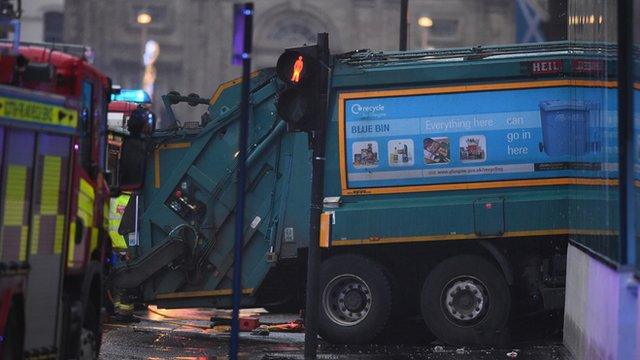
- Published18 June 2015
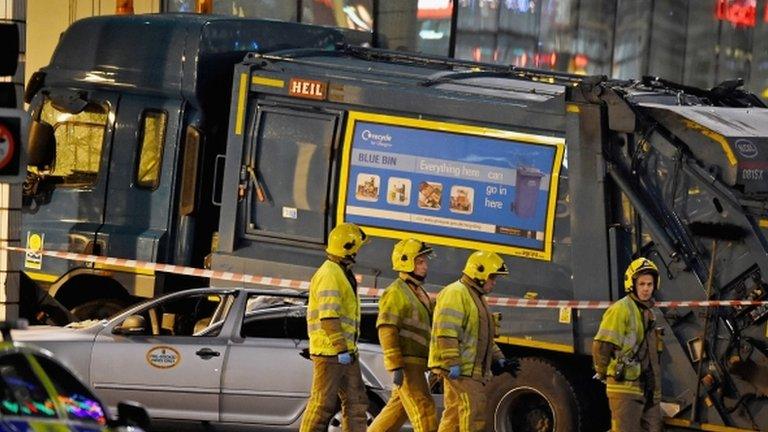
- Published25 February 2015
